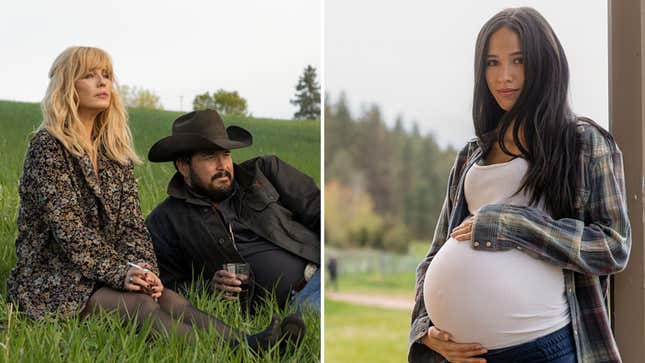How ‘Yellowstone’ Grapples With the Trauma of Child Loss & a Forced Hysterectomy
In Season 5 Episode 4, Beth's rage over her forced sterilization and Monica's loss make for uneasy but impactful viewing.
EntertainmentTV

When I’m explaining Yellowstone to people, I tell them it’s important to go in with tempered expectations about the narrative. Did one episode feature a human man nearly having emergency surgery in a roving veterinary ambulance? Sure. Has someone on this show died after a rattlesnake was taken out of a cooler and thrown in their face? Absolutely.
But every once in a while, amid the high camp that is Cowboy Drama™, there are poignant moments. And to Yellowstone’s credit, the series usually gets those moments more right than wrong. Creator Taylor Sheridan has (especially for the Western genre) dedicated a good chunk of plot to the violence and disappearances indigenous women have faced out West. One of his more powerful stories highlighted the history of forced sterilization of indigenous women upon receiving health care—in this case, abortion.
That plot point, first introduced in Season 3, came back up in Episode 4 of Season 5, “Horses in Heaven.” Last night’s episode follows the stories of two women. Monica Dutton (Kelsey Asbille), the indigenous wife of Kayce Dutton (Luke Grimes), finally buries her infant son, who died an hour after the car accident that forced her to give birth to him on the side of the road as her son called an ambulance. Meanwhile, her sister-in-law Beth Dutton (Kelly Reilly) is haunted by her past after she clocks the carseat her brother made ready in his car. Decades ago, Beth had an abortion, which this same brother had cosigned for. But he had withheld from her that the women’s clinic where she would get the abortion required she also get a full hysterectomy—a far-too-common practice at clinics that provided care for indigenous women until well into the 1970s. Realizing that her estranged brother had a baby, an option he had helped take from her, riles up all sorts of rage within Beth that she usually keeps reserved for unsuspecting businessmen or losers at the bar.
-

-

-

-

-

-

-

-

-

-

-

-

-

-

-

-

-

-

-

-

-

-

-

-

-

-

-

-

-

-

-

-

-

-

-

-

-

-

-

-








































